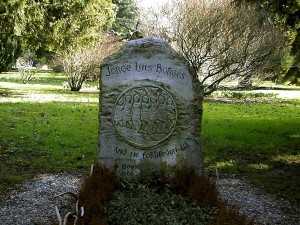Jorge Luis Borges � Invisible Man
by Mateo Sancho Cardiel

On march 6, 1986, a few weeks before he died, the Argentinean writer Jorge Luis Borges sent a letter to the EFE [news] agency in which he affirmed his determination to be an �invisible man� in Geneva, a city in which he felt �mysteriously happy�.
Amidst the current polemics caused by the Peronist* legislator Mar�a Beatriz Lenz�s idea� to repatriate Borges�s mortal remains to Argentina, this document throws light on the writer�s fondness for the Swiss city during the last days of his life.
He had studied at the university there and returned on numerous occasions and now, 23 years after his death, the debate has reopened about whether his wish as an individual should be transcended by his position as part of his country�s cultural patrimony. �
�I am a free man. I have decided to stay in Geneva, because Geneva corresponds to the happiest years of my life,� he explains in the letter he sent to the then president of EFE, Ricardo Utrilla, and disseminated on May 21, 1986.
Borges, who had defined death as �the great hope that remains to me� in an interview three years previously, died on June 14, 1986, six weeks before his 87th birthday, and was buried in Geneva in the Plainpalais cemetery. But the Argentinean congresswoman proposes that his remains be transferred to the Recoleta cemetery in Buenos Aires.
�My Buenos Aires is still one of guitars, of milongas, (Argentinean folklore music) of water-wells and of courtyards. None of that exists now. It�s a big city just like many others,� Borges wrote in the letter. �I feel strangely happy in Geneva. This has nothing to do with the culture of my ancestors and the basic love of country. It seems strange,� he concludes, �that someone doesn�t understand and respect this decision by a man who, like one of [H.G.]Wells�s characters, has determined to be an invisible man.�
These testimonies brought to mind � and seemed to contradict � what his biographer Alejandro V�ccaro maintains or what Borges himself (born in Buenos Aires on August 24, 1899) affirmed in a 1969 interview for the French documentary �Le pass� qui ne menace pas�, about his wish to be buried in Buenos Aires.
The author of Ficciones (Fictions) broke his months-long silence with the cited letter, with which he wanted to end �journalists� harassment� who, at that time, had created the umpteenth controversy about his residence in Geneva and his marriage to his secretary and companion, Mar�a Kodama.
�I am sending you these lines for you to publish them wherever you please in order to end once and for all the phone calls and questions, of which I am tired,� he wrote on a typewriter and signed by hand.
Borges, traditionally critical of those in power in Argentina, found refuge in Switzerland from accusations that he was a traitor to his homeland, but even there he was harassed by the press, Paloma Caballero, Efe�s bureau chief in Geneva at that time, says.
According to the journalist, Borges� relationship with Argentine journalists in that city was �a nightmare,� and that explains why the author turned to Efe, an agency with which he had �an excellent relationship� and for which he also had contributed articles.
�The reporters (from Argentina) � many of them considered yellow journalists � wouldn�t stop coming to the Swiss city and camped out at a downtown Geneva hotel � which no longer exists � where Borges always stayed,� Caballero said.
That situation got even worse after his death, with Kodama � now in her mid-60s � becoming the target of attention.
�She went out on the street terrified. They would follow her to the bank to see how much money she was withdrawing, since articles were being written about the late writer�s million-dollar bank accounts in Switzerland,� the journalist said.
She added that the reason at that time for wanting to transfer Borges� remains to Argentina had less to do with �paying tribute to him as a great writer� than the question of the inheritance.Family members, friends and former domestic employees were all seeking a piece of his estate, of which Kodama, according to Swiss law, was the sole beneficiary. In Argentina, that situation would have been different because their marriage, which took place in Paraguay just months before Borges� death, was not recognized.
Finally, after analyzing the matter for several days, the Swiss government decided to inter Borges� body in Geneva�s most prestigious cemetery, where � in a simple grave alongside renowned figures such as John Calvin and Jean Piaget � �I�m sure he is resting happily,� Caballero said.
� EfE
*Borges detested Per�n and Peronists, and the feeling was mutual. The fact that the Congresswoman proposing that his remains be repatriated to Argentina is a Peronist seems not only ironic, but also hypocritical.
He is buried in a simple grave at the Cimeti�re de Plainpalais in Geneva, and on his tombstone is a quotation from the Old English poem �The Battle of Maldon�: �and ne forhtedon n�, and be not afraid. [Ed.]
